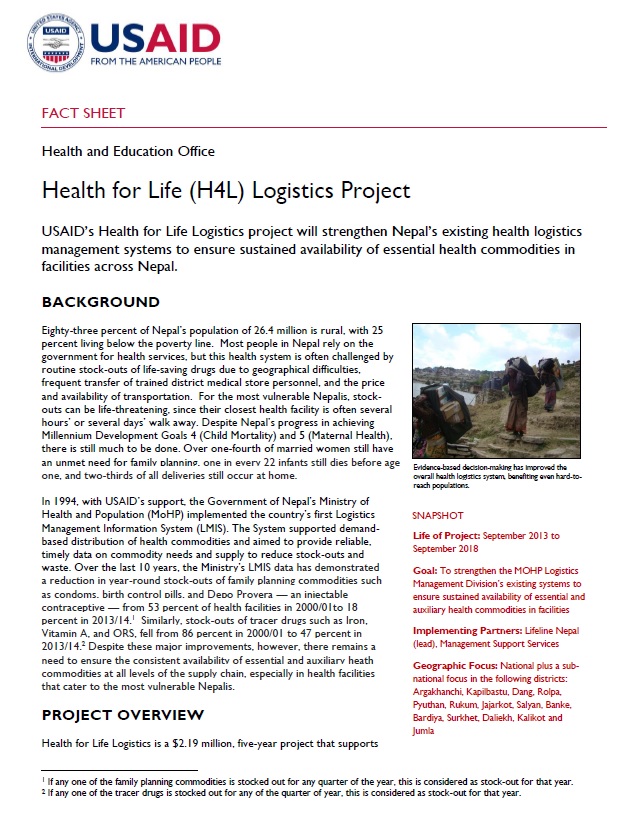Health for Life (H4L) Logistics Project
USAID’s Health for Life Logistics project will strengthen Nepal’s existing health logistics management systems to ensure sustained availability of essential health commodities in facilities across Nepal.
BACKGROUND
Health for Life (H4L) Logistics Project ![]() (pdf - 163k)
(pdf - 163k)
Eighty-three percent of Nepal’s population of 26.4 million is rural, with 25 percent living below the poverty line. Most people in Nepal rely on the government for health services, but this health system is often challenged by routine stock-outs of life-saving drugs due to geographical difficulties, frequent transfer of trained district medical store personnel, and the price and availability of transportation. For the most vulnerable Nepalis, stock-outs can be life-threatening, since their closest health facility is often several hours’ or several days’ walk away. Despite Nepal’s progress in achieving Millennium Development Goals 4 (Child Mortality) and 5 (Maternal Health), there is still much to be done. Over one-fourth of married women still have an unmet need for family planning, one in every 22 infants still dies before age one, and two-thirds of all deliveries still occur at home.
In 1994, with USAID’s support, the Government of Nepal’s Ministry of Health and Population (MoHP) implemented the country’s first Logistics Management Information System (LMIS). The System supported demand-based distribution of health commodities and aimed to provide reliable, timely data on commodity needs and supply to reduce stock-outs and waste. Over the last 10 years, the Ministry’s LMIS data has demonstrated a reduction in year-round stock-outs of family planning commodities such as condoms, birth control pills, and Depo Provera — an injectable contraceptive — from 53 percent of health facilities in 2000/01to 18 percent in 2013/14. Similarly, stock-outs of tracer drugs such as Iron, Vitamin A, and ORS, fell from 86 percent in 2000/01 to 47 percent in 2013/14. Despite these major improvements, however, there remains a need to ensure the consistent availability of essential and auxiliary heath commodities at all levels of the supply chain, especially in health facilities that cater to the most vulnerable Nepalis.
PROJECT OVERVIEW
Health for Life Logistics is a $2.19 million, five-year project that supports the MoHP to monitor its stock of health commodities and use data from the logistics and health management information systems to make informed and timely stock-supply decisions. The project aims to:
- Support the decentralization of the MoHP’s Logistics Management Division (LMD) by strengthening the demand-based distribution of health commodities and the Web-based LMIS.
- Successfully integrate HIV/AIDS logistics into the main logistics systems without compromising the quality or timeliness of commodity provision.
- To enhance the LMD’s capacity for consistent implementation of programs without external assistance
The project works in close collaboration with the government’s Department of Health Services, National Center for AIDS and Sexually Transmitted Disease Control, and a number of other stakeholders. In addition to its national focus, the project seeks to increase health service utilization by the poorest, marginalized and hard-to-reach populations, by strengthening the government’s existing logistics system in local health facility and community settings.
PROJECT ACTIVITIES
- Expand Web-based LMIS down to health facilities in selected districts
- Strengthen the distribution system in health centers across the supply chain, so that each level of the supply chain works in concert with the other levels
- Support collaboration between the HIV/AIDS logistics system and national health logistics system to identify challenges and opportunities for systems integration
- Work with districts to facilitate contracting out for the transportation of health commodities to health facilities using private transporters for efficiency and effectiveness
- Enhance the LMD’s capacity for human resource management, monitoring and evaluation, planning, budgeting, and supply chain management activities including forecasting, logistics management information system, procurement planning, quality assurance, storage, and distribution
H4L Logistics will support the Government of Nepal to achieve the following results:
- Health facilities at the district level and below empowered to make informed decisions about the commodities supply based on local needs
- Vulnerable groups, women, girls, and newborns receive improved HIV services through greater efficiency in HIV/AIDS logistics management
- The national supply chain system continues to reduce stock-outs and wastage








Comment
Make a general inquiry or suggest an improvement.